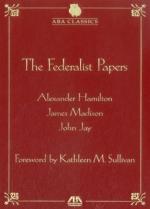|
This section contains 13,239 words (approx. 45 pages at 300 words per page) |

|
SOURCE: Pangle, Thomas L. “The Federalist Papers' Vision of Civic Health and the Tradition Out of Which That Vision Emerges.” Western Political Quarterly 39, no. 4 (December 1986): 577-602.
In the following essay, Pangle explores The Federalist Papers's use of and deviation from the classical tradition of Republicanism, suggesting that Publius developed a new definition of civic virtue. Citing influences such as Machiavelli, Hume, and Montesquieu, Pangle highlights the path of Publius in creating a new idea of civic health and of liberty itself.
The bicentennial of the American Constitution invites us to reconsider not only the legal and constitutional theory that informed the framing, but also the more fundamental and difficult question of the kind of human being and the way of life the Founders saw the new regime as fostering. The inhabitants of the United States (and, increasingly, of the West in general) are willy-nilly molded, in decisive...
|
This section contains 13,239 words (approx. 45 pages at 300 words per page) |

|


